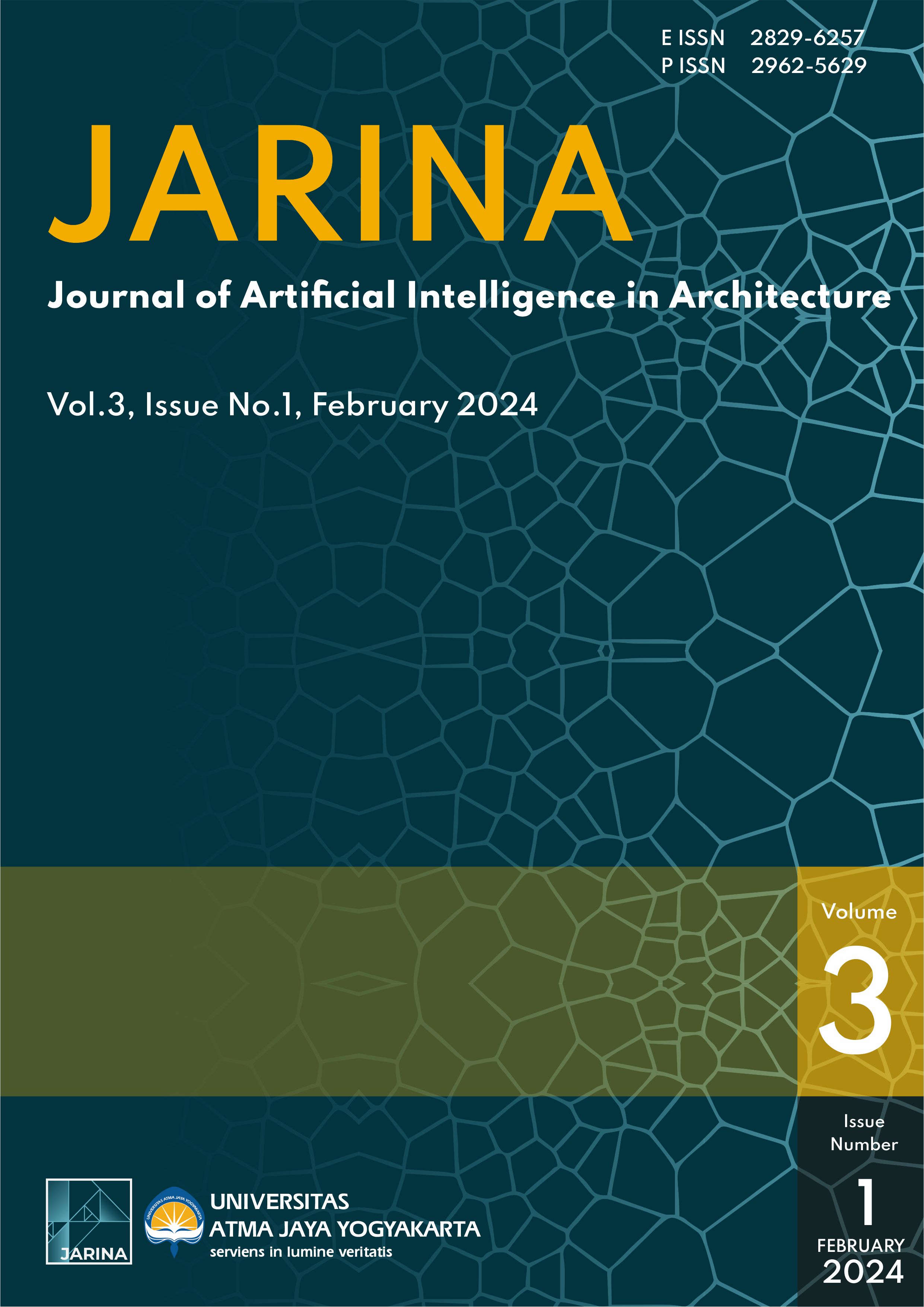Generative Artificial Intelligence to Enhance Architecture Education to Develop Digital Literacy and Holistic Competency
DOI:
https://doi.org/10.24002/jarina.v3i1.8347Keywords:
Generative AI, Architecture Education, Holistic Competency, Design Studio, Signature PedagogyAbstract
This research investigates the impact of Generative Artificial Intelligence (GenAI) on digital literacy development and holistic competencies in Architecture education. The research design focuses on applying GenAI tools such as ChatGPT, Midjourney, BricsCAD BIM, and VR/AR software and their influence on architectural students' overall competencies. This paper uses a mixed research approach combining a case study of Architecture students' progress in a residential revisitation project, using Midjourney, BricsCAD BIM, and VR/AR software, with an online questionnaire survey administered to 350 undergraduate students at two leading universities in Mainland China and Hong Kong in the 2023-2024 school year. This approach aims to deepen understanding of GenAI's influence on conceptual creativity, initiative, self-management, and stress tolerance within a holistic competency framework. The research results indicate that architecture students frequently use GenAI tools during the design concept stage, suggesting their relevance to specific pedagogy in-studio learning and conceptual creativity. Additionally, the findings reveal a potential correlation between frequent GenAI tool usage, improved time management, and reduced anxiety among Architecture students. The results enhance understanding of digital technology in Architecture education while providing valuable insights for future GenAI implementations. The study highlights the potential benefits of incorporating GenAI, emphasizing their role in fostering creativity, effective time management, and stress tolerance among Architecture students.
References
Y. K. Dwivedi et al., “‘So what if ChatGPT wrote it?’ Multidisciplinary perspectives on opportunities, challenges and implications of generative conversational AI for research, practice and policy,” Int J Inf Manage, vol. 71, Aug. 2023, doi: 10.1016/j.ijinfomgt.2023.102642.
C. K. Y. Chan, “A comprehensive AI policy education framework for university teaching and learning,” International Journal of Educational Technology in Higher Education, vol. 20, no. 1, Dec. 2023, doi: 10.1186/s41239-023-00408-3.
D. Baidoo-Anu and L. Owusu Ansah, “Education in the Era of Generative Artificial Intelligence (AI): Understanding the Potential Benefits of ChatGPT in Promoting Teaching and Learning,” Journal of AI, vol. 52, no. 7, pp. 52–62, 2023.
J. Escalante, A. Pack, and A. Barrett, “AI-generated feedback on writing: insights into efficacy and ENL student preference,” International Journal of Educational Technology in Higher Education, vol. 20, no. 1, Dec. 2023, doi: 10.1186/s41239-023-00425-2.
T. Nazaretsky, M. Ariely, M. Cukurova, and G. Alexandron, “Teachers’ trust in AI-powered educational technology and a professional development program to improve it,” British Journal of Educational Technology, vol. 53, no. 4, pp. 914–931, Jul. 2022, doi: 10.1111/bjet.13232.
F. Fui-Hoon Nah, R. Zheng, J. Cai, K. Siau, and L. Chen, “Generative AI and ChatGPT: Applications, challenges, and AI-human collaboration,” Journal of Information Technology Case and Application Research, vol. 25, no. 3. Routledge, pp. 277–304, 2023. doi: 10.1080/15228053.2023.2233814.
R. ; Tindle, K. ; Pozzebon, R. ; Willis, and A. A. Moustafa, “Academic Misconduct and Generative Artificial Intelligence: University Students’ Intentions, Usage, and Perceptions,” vol. 13, 2023, doi: 10.31234/osf.io/hwkgu.
H. Singh, M. H. Tayarani-Najaran, and M. Yaqoob, “Exploring Computer Science Students’ Perception of ChatGPT in Higher Education: A Descriptive and Correlation Study,” Educ Sci (Basel), vol. 13, no. 9, Sep. 2023, doi: 10.3390/educsci13090924.
M. Farrokhnia, S. K. Banihashem, O. Noroozi, and A. Wals, “A SWOT analysis of ChatGPT: Implications for educational practice and research,” Innovations in Education and Teaching International, 2023, doi: 10.1080/14703297.2023.2195846.
E. Kasneci et al., “ChatGPT for good? On opportunities and challenges of large language models for education,” Learning and Individual Differences, vol. 103. Elsevier Ltd, Apr. 01, 2023. doi: 10.1016/j.lindif.2023.102274.
C. K. Y. Chan and L. Y. Y. Luk, “A four-dimensional framework for teacher assessment literacy in holistic competencies,” Assess Eval High Educ, vol. 47, no. 5, pp. 755–769, 2022, doi: 10.1080/02602938.2021.1962806.
J. Luo and C. K. Y. Chan, “Conceptualising evaluative judgement in the context of holistic competency development: results of a Delphi study,” Assess Eval High Educ, vol. 48, no. 4, pp. 513–528, 2023, doi: 10.1080/02602938.2022.2088690.
C. K. Y. Chan and S. W. Chen, “Students’ perceptions on the recognition of holistic competency achievement: A systematic mixed studies review,” Educational Research Review, vol. 35. Elsevier Ltd, Feb. 01, 2022. doi: 10.1016/j.edurev.2021.100431.
N. Law, D. Woo, J. de la Torre, and G. Wong, “A Global Framework of Reference on Digital Literacy Skills for Indicator 4.4.2,” 2018.[Online]. Available: http://www.uis.unesco.org
A. Morgan, R. Sibson, and D. Jackson, “Digital demand and digital deficit: conceptualising digital literacy and gauging proficiency among higher education students,” Journal of Higher Education Policy and Management, vol. 44, no. 3, pp. 258–275, 2022, doi: 10.1080/1360080X.2022.2030275.
O. Zawacki-Richter, V. I. Marín, M. Bond, and F. Gouverneur, “Systematic review of research on artificial intelligence applications in higher education – where are the educators?” International Journal of Educational Technology in Higher Education, vol. 16, no. 1. Springer Netherlands, Dec. 01, 2019. doi: 10.1186/s41239-019-0171-0.
P. Zhang and M. N. Kamel Boulos, “Generative AI in Medicine and Healthcare: Promises, Opportunities and Challenges,” Future Internet, vol. 15, no. 9. Multidisciplinary Digital Publishing Institute (MDPI), Sep. 01, 2023. doi 10.3390/fi15090286.
S. Yu and F. Carroll, “A Balance of Power: Exploring the Opportunities and Challenges of AI for a Nation,” in Applications for Artificial Intelligence and Digital Forensics in National Security, R. Montasari, Ed., Springer, 2023, pp. 15–37. doi: 10.1007/978-3-031-40118-3_2.
W. Xu and F. Ouyang, “The application of AI technologies in STEM education: a systematic review from 2011 to 2021,” International Journal of STEM Education, vol. 9, no. 1. Springer Science and Business Media Deutschland GmbH, Dec. 01, 2022. doi: 10.1186/s40594-022-00377-5.
A. Pack and J. Maloney, “Using Generative Artificial Intelligence for Language Education Research: Insights from Using OpenAI’s ChatGPT,” TESOL Quarterly, vol. 57, no. 4, pp. 1571–1582, Dec. 2023, doi: 10.1002/tesq.3253.
R. Godwin-Jones, “Expanding and contextualising digital language learning,” Bilingualism, vol. 25, no. 3. Cambridge University Press, pp. 386–387, May 14, 2022. doi: 10.1017/S1366728921000547.
W. Tseng and M. Warschauer, “AI-writing tools in education: if you can’t beat them, join them,” Journal of China Computer-Assisted Language Learning, vol. 3, no. 2, pp. 258–262, Oct. 2023, doi: 10.1515/call-2023-0008.
D. Johnson et al., “Assessing the Accuracy and Reliability of AI-Generated Medical Responses: An Evaluation of the Chat-GPT Model.,” Res Sq, Feb. 2023, doi: 10.21203/rs.3.rs-2566942/v1.
World Economic Forum, “These are the top 10 job skills of tomorrow – and how long it takes to learn them.” Accessed: Dec. 05, 2023. [Online]. Available: https://www.weforum.org/agenda/2020/10/top-10-work-skills-of-tomorrow-how-long-it-takes-to-learn-them/
N. Novoselchuk, L. Shevchenko, and E. Mass, “Artificial intelligence in Architecture and education: Potential, tendencies, perspectives,” in Artificial intelligence: An era of new threats or opportunities? I. Tatomyr and L. Kvasnii, Eds., Oktan Print, 2023, pp. 125–136. doi: 10.46489/aiaeont-23-23.
J. C. Cassady, “Anxiety in the Schools: Causes, Consequences, and Solutions for Academic Anxieties,” in Handbook of Stress and Academic Anxiety: Psychological Processes and Interventions with Students and Teachers, Springer International Publishing, 2022, pp. 13–30. doi: 10.1007/978-3-031-12737-3_2.
R. J. Collie, N. E. Perry, and A. J. Martin, “School Context and Educational System Factors Impacting Educator Stress,” in Educator Stress: Aligning Perspectives on Health, Safety and Well-Being, 2017, pp. 3–22. doi: 10.1007/978-3-319-53053-6_1.
J. Huang, Y. T. Nigatu, R. Smail-Crevier, X. Zhang, and J. Wang, “Interventions for common mental health problems among university and college students: A systematic review and meta-analysis of randomised controlled trials,” Journal of Psychiatric Research, vol. 107. Elsevier Ltd, pp. 1–10, Dec. 01, 2018. doi: 10.1016/j.jpsychires.2018.09.018.
A. Häfner, A. Stock, L. Pinneker, and S. Ströhle, “Stress prevention through a time management training intervention: An experimental study,” Educ Psychol (Lond), vol. 34, no. 3, pp. 403–416, 2014, doi: 10.1080/01443410.2013.785065.
R. Misra and M. Mckean, “College students’ academic stress and its relation to their anxiety, time management, and leisure satisfaction,” Am J Health Stud, vol. 16, no. 1, pp. 41–51, 2000.
S. BuHamdan, A. Alwisy, and A. Bouferguene, “Generative systems in the Architecture, engineering and construction industry: A systematic review and analysis,” International Journal of Architectural Computing, vol. 19, no. 3. SAGE Publications Inc., pp. 226–249, Sep. 01, 2021. doi: 10.1177/1478077120934126.
P. Ghimire, K. Kim, and M. Acharya, “Generative AI in the Construction Industry: Opportunities & Challenges,” Sep. 2023, Accessed: Dec. 05, 2023. [Online]. Available: http://arxiv.org/abs/2310.04427
L. S. Shulman, “Signature Pedagogies in the Professions,” Daedalus, vol. 134, no. 3, pp. 52–59, 2005.
L. Wang, M. Huang, X. Zhang, R. Jin, and T. Yang, “Review of BIM Adoption in the Higher Education of AEC Disciplines,” Journal of Civil Engineering Education, vol. 146, no. 3, Jul. 2020, doi: 10.1061/(ASCE)EI.2643-9115.0000018.
N. Dehouche, “Plagiarism in the age of massive Generative Pre-trained Transformers (GPT-3),” Ethics Sci Environ Polit, vol. 21, pp. 17–23, 2021, doi: 10.3354/esep00195.
R. Sadeghi, “The attitude of scholars has not changed towards plagiarism since the medieval period: Definition of plagiarism according to Shams-e-Qays, thirteenth-century Persian literary scientist,” Res Ethics, vol. 15, no. 2, pp. 1–3, Apr. 2019, doi: 10.1177/1747016116654065.
Downloads
Published
How to Cite
Issue
Section
License
Copyright (c) 2024 Dr. Tris Kee , Professor Blair Kuys, Dr. Ronnel King

This work is licensed under a Creative Commons Attribution 4.0 International License.
Authors who publish with this journal agree to the following terms:
1.Authors retain copyright and grant the journal right of first publication with the work simultaneously licensed under a Creative Commons that allows others to share the work with an acknowledgement of the work's authorship and initial publication in this journal.
2.Authors are able to enter into separate, additional contractual arrangements for the non-exclusive distribution of the journal's published version of the work (e.g., post it to an institutional repository or publish it in a book), with an acknowledgement of its initial publication in this journal.
3.Authors are permitted and encouraged to post their work online (e.g., in institutional repositories or on their website) prior to and during the submission process, as it can lead to productive exchanges, as well as earlier and greater citation of published work (See The Effect of Open Access).

















